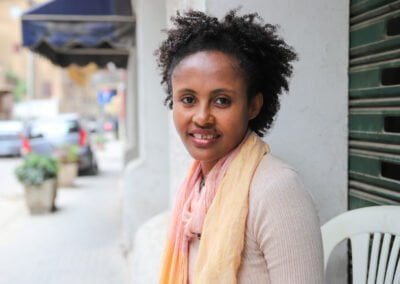
“I was seven when I started writing in my diary. It was in the middle of the civil war and the basement of our building which was a clothing factory became our shelter. From my little window I could see the snipers aim and bombs falling on Beirut. I was so affected by the war that I would write down everything I saw and felt. My diary had a beautiful green cover and it became my best friend, my all time confidant. Every time I finished writing I would hide it as a treasure so no one could find it. At some point our neighborhood became a hotspot. Bombs were flying around so we had to flee. I was afraid of losing my diary so I hid it very carefully in the shelter where I was sleeping. One year later, when we returned, the building had been rebuild after all the damage of the war. The first thing I did was look for my diary but it was nowhere to be found. For many years I searched until at some point I came to realize that I would never find it again. I couldn’t write for a long time. I felt that I had lost my story. Sometimes, I still stand in front of that same building and I feel like that 7-year-old-girl again who wants to go into the shelter to try to find her diary, to find her story.”
(Beirut, Lebanon)

2/2 “My parents had four children and I am one of them. When I was 8, my father decided that we should move to Lebanon in order to reconnect with our Lebanese heritage. When I was 18, I met a boy and we started to go out. It was the same year that my parents decided to move back to Venezuela. My mother said: ‘’Lulu, this guy seems very nice. Why don’t you marry him and stay here in Lebanon?’’ I told her that I really liked him but that I still wanted to study. She said that I could always go back to university once I got married. I thought about it and I decided to marry him. I really liked him. He was an architect, a gentleman and most of all he really respected my freedom. After one year our son was born. I remember the years that followed
as a period filled with parties, having a lot of fun and living life to the fullest. Seven years after my first son was born I got pregnant again. After I gave birth to our second son, I received a letter from my mother and it said: ‘’Have you forgotten about university?’’ She wrote: ‘’Even though you have a husband, you need to be able to take care of yourself. Make sure to have a diploma in your hands.’’ That is when I decided to go to art school and I became a painter.”
(Beirut, Lebanon)

(2/3) “My friend told me that my youngest brother got murdered. He got into trouble with a group of criminals in Aleppo and they killed him. I immediately packed my stuff and I went back to Aleppo for the funeral. The next day, after the funeral my father and grandfather came up to me. They told me that I needed to take revenge on the men who killed my little brother. They had already arranged a gun for me. As much as I was hurt, there was no way I was going to kill anyone. I told them: ‘’If I do it, there is no difference between me and the criminals who killed my brother.’’ That night I left Aleppo and I decided to never come back. I got back to Damascus and someone had broken into my room and stolen all my money and clothes. I have never felt so lonely in my entire life. I couldn’t ask anyone for help. I went back to work and tried to survive and rebuild my financial situation. In 2011 the war started and the situation in Damascus became unstable. A few years later I got drafted in by the Army. Again I didn’t want to fight so I postponed my service and left Syria. I came to Lebanon and the first thing I did was trying to find a job. Once I found work I was tried to find shelter. I went to the UN office because someone told me that Syrians could apply for refugee status which can give you benefits. When I arrived at the UN office there was a huge line and people were treated horribly. I realized that it would take days for me to receive some sort of help. I didn’t want to risk losing my new job as a tailor. So even though I fled my country, officially I am not a refugee.”
(Beirut, Lebanon)






Recent Comments